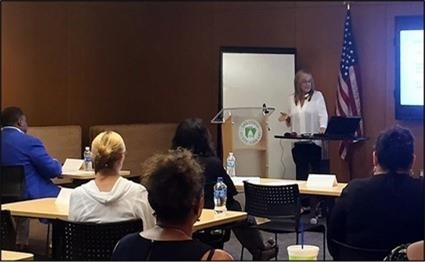
Partners for Inclusive Communities has been awarded a $455,454 Arkansas COVID-19 Rapid Response Project grant to help people with disabilities and older residents who have been impacted by COVID-19.
Partners is the University Center of Excellence for Developmental Disabilities Education, Research and Service for the state of Arkansas. The organization is administratively located in the University of Arkansas' College of Education and Health Professions and has a main office in Little Rock. Partners' mission is inclusion of people with disabilities in community life.
The grant, from the U.S. Department of Health and Human Services, Administration on Community Living, tasks Partners with developing a No Wrong Door Rapid Response Project for COVID-19.
A coalition of agencies and organizations will determine immediate and urgent needs created or exacerbated by the pandemic, coordinate efforts to respond to these needs, develop or enhance innovative services, and collect/maintain data that can inform future planning, said the director of Partners, Karan Burnette.
"Partners has brought together a broad group of stakeholders including state agency representatives, community-based service providers, advocates from the disability and aging community, managed care organizations and others and is in the process of collecting information from a state-wide survey to identify critical needs," she said.
Needs could include food insecurity, shelter, access to Personal Protective Equipment, access to staff who provide in-home supports or may reflect larger needs such as internet connectivity and person-friendly instruction on how to utilize technology that may be available.
"Beyond the direct impact of contact with the virus, of specific concern is the social isolation being experienced by people with disabilities and older Arkansans as restrictions for social distancing have been enforced," Burnette said.
A database is being created to track data and will allow stakeholders to enter the information directly into a real-time system. This system will be used to determine priorities, regional differences in identified needs, and community partners for the response phase of the project.
Preliminary results of data collection suggest that the top priorities within both target groups are the need for technology as well as training on how to use it, Burnette said.
"It is my hope that by responding to this need, individuals with disabilities and older Arkansans will be able to safely connect with family and friends or their physicians as needed, order groceries and medications for delivery, or many other possibilities," she said. "We want them to have access to the same virtual supports that help them stay connected and safe — the same ones all of us have been taking advantage of during this time.
"All Americans — including people with disabilities and older adults — should be able to live at home with the supports they need, and participate in communities that value their contributions."
Burnette said the mission of the Administration on Community Living aligns perfectly with Partners' vision of community belonging for every Arkansan.
Topics
Contacts
Karan Baker Burnette, co-director
Partners for Inclusive Communities
800-342-2923,
Shannon Magsam, director of communications
College of Education and Health Professions
479-575-3138,